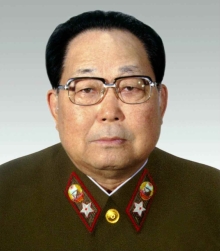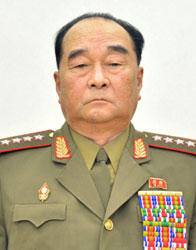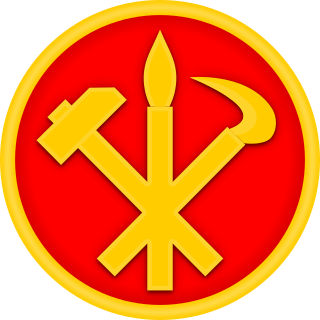Related Research Articles
Pak Pong-ju is a North Korean politician who served as the Premier of North Korea from 2003 to 2007 and again from 2013 to 2019. He was elected a member of the Presidium of the Workers' Party of Korea (WPK) in 2016.

In the North Korean government, the Cabinet is the administrative and executive body. The North Korean government consists of three branches: administrative, legislative, and judicial. However, they are not independent of each other, but all branches are under the exclusive political leadership of the Workers' Party of Korea (WPK).

Kim Jong Un is a North Korean politician who has been supreme leader of North Korea since 2011 and the leader of the Workers' Party of Korea (WPK) since 2012. He is the third son of Kim Jong Il, who was North Korea's second supreme leader from 1994 to 2011, and Ko Yong Hui. He is a grandson of Kim Il Sung, who was the founder and first supreme leader of North Korea from its establishment in 1948 until his death in 1994.

The Commander-in-Chief of the Armed Forces of Democratic People's Republic of Korea is the commander-in-chief of the Korean People's Army, the military of North Korea. The office was established on 4 July 1950 and abolished with the passing of a new constitution in 1972. Since then, the office of President of North Korea, the Chairman of the National Defence Commission and the President of the State Affairs Commission have been referred to as supreme commanders in accordance with the constitution.

Jo Myong-rok was a North Korean military officer who held the military rank Chasu. In 1998, he was appointed first vice-chairman of the National Defence Commission of North Korea, Director of the Korean People's Army General Political Bureau. Previously, he was the commander of the air defence forces.

Kim Yong-chun was a North Korean soldier and politician. He was a leader of the North Korean military. He held the North Korean military rank Chasu, was Vice Chairman of the National Defense Commission of North Korea, and was Minister of People's Armed Forces. He held a minor post within the Workers Party.

The President of the State Affairs Commission of the Democratic People's Republic of Korea, alternatively styled "President of State Affairs" in official translations, is the supreme leader and head of state of North Korea. The president chairs the State Affairs Commission (SAC), which is the highest leadership institution in North Korea, and serves as the commander-in-chief of the North Korean armed forces.

Jang Song-thaek was a North Korean politician. He was married to Kim Kyong-hui, the only daughter of North Korean premier Kim Il Sung and his first wife Kim Jong-suk, and only sister of North Korean general secretary Kim Jong Il. He was therefore the uncle of the current leader of North Korea, Kim Jong Un.
O Jin-u was a North Korean general and politician. He served with Kim Il Sung's partisan unit and eventually rose through the ranks of the North Korean Army. He distinguished himself during the Korean War and was a trusted adviser of Kim Il Sung until his death, also being his chief guard in 1945. Thanks to his relationship with Kim Il Sung, O Jin-u was able to enjoy wealth and fame, this lasted even under Kim Jong Il. He was the Minister of Armed Forces from May 1976 until his death in February 1995. O was considered the third-most powerful person in North Korea, after Kim Il Sung and his son Kim Jong Il, therefore making him the most powerful person that possessed no blood relations to the Kim family. He was considered by many as a hardliner and advocated strongly for North Korea's nuclear program.

The Ministry of State Security of the Democratic People's Republic of Korea is the secret police agency of North Korea. It is an autonomous agency of the North Korean government reporting directly to the Supreme Leader. In addition to its internal security duties, it is involved in the operation of North Korea's concentration camps and various other hidden activities. The agency is reputed to be one of the most brutal secret police forces in the world, and has been involved in numerous human rights abuses.

Hyon Chol-hae was a North Korean military officer and politician who was closely tied to the ruling Kim family. He served as Kim Il-sung's bodyguard during the Korean War and reported directly to Kim Jong-il as deputy director of the General Political Department. In 2016, he was promoted to Marshal of the Korean People's Army, the Army's highest rank.

O Kuk-ryol was a North Korean military general. He was Chief of General Staff of the Korean People's Army from 1979 to 1988. He also served as vice-chairman of the National Defence Commission of North Korea, head of the Operations Department from April 2009 to June 2016. Foreign observers referred to O as the second most powerful man in North Korea.

Vice Marshal Ri Yong-ho was a North Korean military officer who was Chief of the General Staff of the Korean People's Army from 2009 to 2012, as well as a member of the Presidium of the Workers' Party of Korea from September 2010 to July 2012.
Kim Jong-gak is a Korean People's Army (KPA) official. He was a member of the Politburo of the Workers' Party of Korea (WPK). He served as Minister of Defence briefly in 2012, and Director of the General Political Bureau of the KPA in 2018.

The death of Kim Jong Il was reported by North Korean state television news on 19 December 2011. The presenter Ri Chun-hee announced that he had died on 17 December at 8:30 am of a massive heart attack while travelling by train to an area outside Pyongyang. Reportedly, he had received medical treatment for cardiac and cerebrovascular diseases, and during the trip, Kim was said to have had an "advanced acute myocardial infarction, complicated with a serious heart shock". However, it was reported in December 2012 by South Korean media that the heart attack had instead occurred in a fit of rage over construction faults in a crucial power plant project at Huichon in Chagang Province.

Choe Ryong-hae is a North Korean politician and military officer who currently serves as Chairman of the Standing Committee of the Supreme People's Assembly and First Vice President of the State Affairs Commission, holding both positions since April 2019. Due to holding the first office, he was considered the head of state of North Korea before the country's constitution was amended to transfer this position to the President of the State Affairs Commission, Kim Jong Un. He is also a member of the Presidium of the Politburo and Vice Chairman of the Workers' Party of Korea (WPK). He also served as Supreme Leader Kim Jong Un's military second-in-command, currently being third top-ranking official in North Korea after Kim Jong Un and premier Kim Tok-hun.
Hyon Yong-chol was a North Korean general and Workers' Party of Korea (WPK) politician. He served as Minister of Defence from 2014 to 2015. In 2015, he was reportedly removed from his post.

General Kim Kyok-sik was a defence minister of North Korea.

The Propaganda and Agitation Department, officially translated as the Publicity and Information Department, is a department of the Central Committee of the Workers' Party of Korea (WPK) tasked with coordinating the creation and dissemination of propaganda in North Korea. It is the highest propaganda organization in the country.
The 3rd Conference of the Workers' Party of Korea was held in Pyongyang on September 28, 2010. The meeting elected the highest authority of the Workers' Party of Korea, and revised the party charter. North Korean leader Kim Jong Il also attended the meeting. A plenary meeting of the Central Auditing Committee of the Workers' Party of Korea and the September 2010 plenary meeting of the Central Committee of the Workers' Party of Korea were held earlier on the same day.
References
- ↑ "揭秘:朝鲜人民武装力量部新部长张正男" [Secret: New Minister of the People's Armed Forces of North Korea, Zhang Zhengnan]. Xinhua News (in Chinese). 2013-05-14. Archived from the original on September 15, 2013. Retrieved 2013-05-28.
- 1 2 3 4 5 Mundy, Simon (13 May 2013). "N Korea replaces armed forces minister". Financial Times. Retrieved 2013-05-14.
- ↑ "KPA Holds Memorial and Loyalty Meeting On KJI Death Anniversary". North Korea Leadership Watch. 17 December 2012. Retrieved 2013-05-28.
- ↑ "North Korea Defense Minister Kim Kyok Sik Replaced With Jang Jong Nam". Huffington Post . 13 May 2013. Retrieved 2013-05-28.
